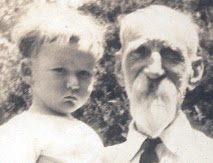Civil War Ancestors
Since I have frequently shared my interest in Civil War history, you can guess that I would want to know all about my Civil War soldier ancestors.
So far I have located one great-great-great grandfather who was a Union soldier from Indiana. I was content with that--pretty exciting. Then I saw a posting from Ancestry that made me wonder:
Since my mother's parents were immigrants from England and Germany, that leaves my father's side. Most of his ancestors go back at least to the American Revolution so potentially, I could have 7 more who fought in the Civil War! I have much more research to do!
 In the meanwhile, I would like to introduce you to Samuel Druley, my great-great-grandfather. I do not have a photograph of him in uniform, but I treasure the one I do have in which he is holding my father.
In the meanwhile, I would like to introduce you to Samuel Druley, my great-great-grandfather. I do not have a photograph of him in uniform, but I treasure the one I do have in which he is holding my father.
Samuel was born in 1840 in Marion, Indiana. He enlisted August 4, 1862, in the 12th Indiana Infantry Regiment, Company C. According to the company descriptive book, he was a farmer, 21 years old, 5 ft. 9 inches, with a light complexion, blue eyes, and dark hair.
His pension files are voluminous because his health was poor after the war and he requested increases to his original pension of $12 per month due to illnesses and injuries contracted during the war. The Pension Office was bureaucracy at its fineness and Samuel supplied many forms, certifications from physicians, and sworn statements from neighbors and other men in his military unit.
It is a shame that he had such an ordeal filing for pension increases, but to my research, it is wonderful because it provides multiple accounts of his time in the war.
After he enlisted, Druley's Regiment headed south where 6,500 inexperienced Federal troops fought a Confederate force of 19,000 at the Battle of Richmond, Kentucky. Just 26 days after he joined the army, Samuel was captured--along with an estimated 4,144 other Union soldiers.
In his pension filing, he states that they slept on the wet ground and he contracted a sore throat and cough. The federal forces were paroled, but Samuel was so sick that he had to be left behind with a friendly farmer while the rest of the troops marched to Cincinnati. He eventually rejoined his unit. By June 1863, the regiment was in Mississipi and participated in the blockage of Vicksburg.
Druley was part of General William Tecumseh Sherman's March to the Sea. In his pension filing, he stated that he was in 28 battles. The testimony of his comrades was that his throat troubles continued throughout and that he frequently sought treatment from the unit's doctors but sickness did not stop him from his duty.
The captain of his company, Edward Lenfesky, testified that "He was always ready to do his share of duty. He was a good faithful soldier. He never shirked his duties. .. He was a splendid soldier, temperate in his habits, and always ready for duty at all times unless wholly incapacitated."
Lenfesky qualified that description, saying that was before Druley's injury.
The unit captured a Confederate munitions manufacturing operation near Cheraw, South Carolina. When retreating, the Southern forces threw a great deal of powder and shot into a ravine. The infantry was resting near the ravine when it exploded. A number of men were killed and many injured. Druley received head and back injuries. Although he was in significant pain, he remained with the unit until the grand parade in Washington, D.C. where the regiment was mustered out June 8, 1865.
Druley returned home to Indiana, where he married Jane Kem, who lived on the farm next to his father's farm. They moved to Peru, Kansas in 1884, which is where my father lived.
In 1924, Samuel Druley requested that the Pension Office physician examine him at home because he was too ill to come to him. He died at age 84 on Dec. 15, 1924, before the pension examination could take place.
His story is not unique. Many more soldiers died of disease than from wounds of war. A federal bureaucracy trying to deal fairly (and often failing) with huge numbers of soldiers is a story that sadly exists today.






No comments:
Post a Comment